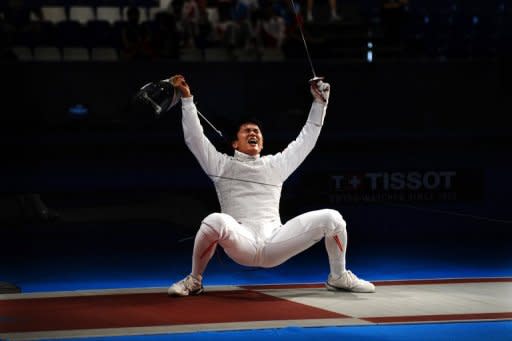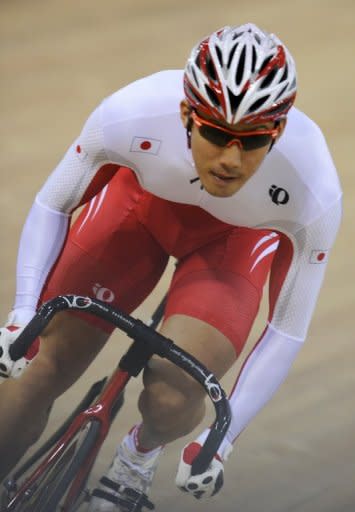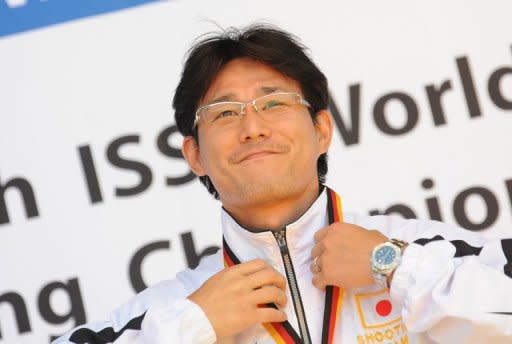Japan Olympians driven by memories of disaster
Fencer Kenta Chida has lost his best friend to a tsunami, cyclist Kazunari Watanabe's family has been split up by the Fukushima nuclear crisis and world shooting champion Tomoyuki Matsuda owes thanks to fellow disaster survivors. Such personal experiences may push them further at the London Olympics as they hope to hang on and cheer up Japan's northeast region ravaged by the earthquake-tsunami-nuclear disaster 16 months ago. The resilience of people in the disaster-struck Tohoku region has spurred many Japanese athletes to give all they have on the world stage before the greatest sporting show on earth. The unfancied national women's football team won the 2011 World Cup in Germany after they were shown by coach Norio Sasaki images of the devastation in a video which ended with a question: "What can we do ourselves?" Now they are aiming for a golden double in London with Tohoku-born defender Azusa Iwashimizu, 25, vowing: "I will fight not just for myself but for all people in Tohoku." Of Japan's 293 London-bound Olympians, one tenth are directly related to Tohoku by having been born and/or schooled there. Matsuda, who won the 50m pistol and the 10m air pistol at the 2010 world championships, has no background links to Tohoku but experienced the catastrophe himself. "I have been given strength by seeing how the disaster area is recovering," said the 36-year-old police officer from Yokohama, who finished eighth in the 50m pistol at the 2008 Beijing Olympics. "I want to get a medal and give strength back to the disaster area." He was practicing at a firing range ahead of the national championships in the Pacific coast city of Ishinomaki when a 9.0-magnitude quake struck offshore and unleashed monster waves on March 11, 2011. He evacuated to a nursing home for the aged and spent a sleepless night with no lighting and heating as the tsunami swallowed everything in the city and left 4,000 people dead or missing. Nearly 19,000 lost their lives in the whole region. "I wasn't sure about what could have happened to me," Matsuda said, recalling how he felt when he watched horrifying scenes on television on his way home, 400 kilometres (250 miles) away. He won the 50m pistol and the 10m air pistol at the World Cup in Sydney only a few weeks later, believing that "my duty is to shoot." Chida learned that his hometown, the major fishing port of Kesennuma, was devastated by the tsunami when the fencer was on the road in Germany. His best friend from boyhood, Satoru Onodera, was drowned. Chida finished a disappointing 11th in foil fencing at Beijing 2008 when his teammate Yuki Ota grabbed the silver. It was Onodera who consoled Chida over drinks when the fencer visited his hometown after Beijing. "It will be your turn in London," Chida quoted the friend as telling him. "Go get a medal no matter what next time." Chida, 27 next month, struggled back to form and finished second at the Asian championships four months after the tragedy. "I may become able to freely show my gratitude for my best friend and my longing for my hometown only when I hold a medal in my hand in London," he said. Watanabe, who finished 12th in the cycling individual sprint in Beijing, lived 3.5 kilometres (two miles) from the Fukushima Daiichi nuclear power plant with his wife, parents, grandmother and the family of his older sister. When the quake and tsunami crippled the plant's cooling systems and sparked reactor meltdowns, the 28-year-old professional keirin racer was at a training camp in Tokyo ahead of the world championships. Radiation has since forced tens of thousands of people to evacuate from within 20 kilometres of the plant and settle somewhere else, not knowing when they can come home. Watanabe's extended family has since lived apart in three different places as about 7,000 people from their town, Futaba, remained scattered across the country. He placed fifth in the keirin and fourth in the team sprint at the world track cycling championships last April, boosting his Olympic medal hopes and giving himself a new role for his hometown. "I will bring a medal back this time and have a victory celebration with you," Watanabe told a send-off ceremony with about 150 former neighbours. Futaba mayor Katsutaka Idogawa said: "I thank Mr. Watanabe for being a driving force to unite the town which has been divided in many ways."




